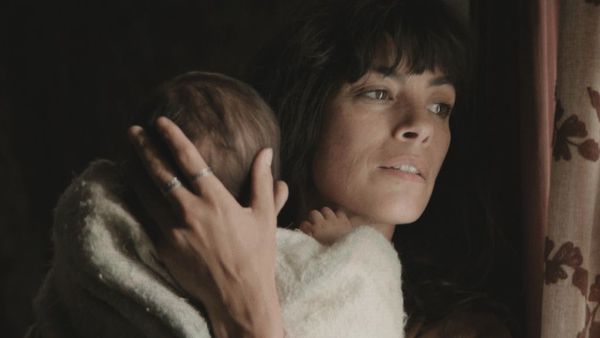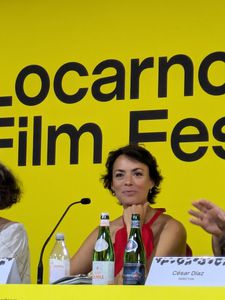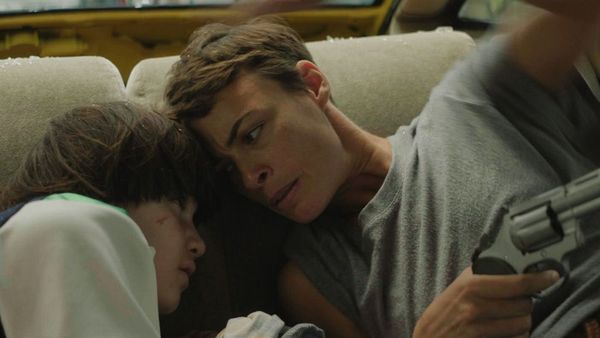 |
| Bérénice Bejo on her role in Mexico 86: 'It was very intense because the character was mixing with my mother’s' Photo: Courtesy of Locarno Film Festival |
She says: “Sometimes, I don’t know why, I felt I was my mother, not César’s mother. I was imagining my mother in a similar situation, so for me it was very emotional and I had to really focus. You know, when you play, you cannot cry over yourself. But I could understand maybe some stuff that my mum went through. So it was very intense because the character was mixing with my mother’s.”
 |
| Bérénice Bejo in Locarno: 'My father was a director before I was born, in Argentina, and his first festival was Locarno, in 1972' Photo: Amber Wilkinson |
She explains: “My father was a director before I was born, in Argentina, and his first festival was Locarno, in 1972. [My mum] sent me the programme, with all the names, so he was with Dino Rizzi, Ken Loach and she was like, ‘You’re going and, my God, it’s like the circle is finished.’ I said to César, ‘Can you imagine, I’m coming to Locarno and the movie I’m showing is not about my parents but has really a lot of connection with my family’.
Speaking about the premiere, she adds: “My parents are not here tonight but I wonder what they will think of the movie because I know there are so many similarities but I’m not sure they will want to talk to me about it after.”
The role of Maria is almost a double one as, on the one hand, she is a revolutionary but, on the other, she is also rediscovering motherhood.
“For me, there were two living roles,” says Bejo. “Julia is the revolutionary and Maria is the mother and it was really a challenge to find the two characters. We could really do a movie about Julia, and it would work, or about Maria. For an actor to play two characters in one movie, it’s always a challenge and it’s always rewarding.”
She notes that she gets a lot of help from the costume department and says that there was a lot of talk about the vast array of wigs she ends up employing for the character.
“In the beginning there were no wigs,” she says. “I said to César, ‘I think we need to transform her a lot.’ There was a lot of talk about whether we should put it in the movie but I think it’s a good decision. It was important because people were following you, killing you, torturing you - it was real. It’s not just a Tootsie thing.”
Bejo has high praise for her young co-star Matheo Labbé, who suddenly finds himself living with his mother after 10 years of being raised by his grandmother (Julieta Egurrola) after the older woman becomes terminally ill.
“He was amazing,” she says. “He’s very mature. He has diabetes, so he’s very aware of a lot of things. And he has a beautiful face and is very tender. We love each other a lot and his mother is amazing, so it was very easy.”
 |
| Bérénice Bejo on her young co-star Matheo Labbé: 'He's very mature' Photo: Courtesy of Locarno Film Festival |
The star says she enjoys working on films in different languages and is happy to act in French, Italian or Spanish.
“Working in another language is like having a new costume,” she says.
She adds: “After Another End, I called my agent and said, ‘Listen, I’m really tired. I feel like I’ve done so many roles that I know by heart already and I don’t want to do them any more because I don’t want to get bored. I don’t want to do supporting actors, I don’t want to do women being unfaithful or having trouble with their kids - I’m tired of that. Either I go back to theatre or I wait.
“The the Netflix thing (Under Paris) arrived and the guy couldn’t find an actress. Nobody wanted to do it. No one wanted to go in the water.”
She said her agent said Bejo might do it “if the script is good and she has fun”. It turns out that when she read the script, in which she plays a scientist who discovers a shark in the Seine, she did. “I imagined me on the Seine looking for the shark. I said, ‘It’s a chance for me, OK, let’s do it’.”
In October, Bejo will have another change of speed, as she takes to the stage in Paris for a one-woman show.
She said: “I’m alone and I’m telling a story, it’s a real story, adapted from a book, who learns, at 27 that she was adopted. She goes to try to find her biological mother and she tries to understand who her adoptive parents are, who are really two crazy people. I’m doing all the characters and now I’m spending all day learning lines. It’s something that has to do with me again because they are Spanish and they used to live in Spain during Franco and they came to France with this adopted girl in 1979, so kind of the same time as my parents. And it’s also about migrants in Paris. What is it like to be from another country, to have another language, to grow up with parents who have an accent - my parents speak with an accent - to eat food that is very different from your friends’. It’s really something I connect to a lot because it’s a little bit of my story, even if I wasn’t adopted. But it talks about what it is to be different, a stranger to a culture.”
Read what César Diaz told us about drawing on his own history for his film.





















